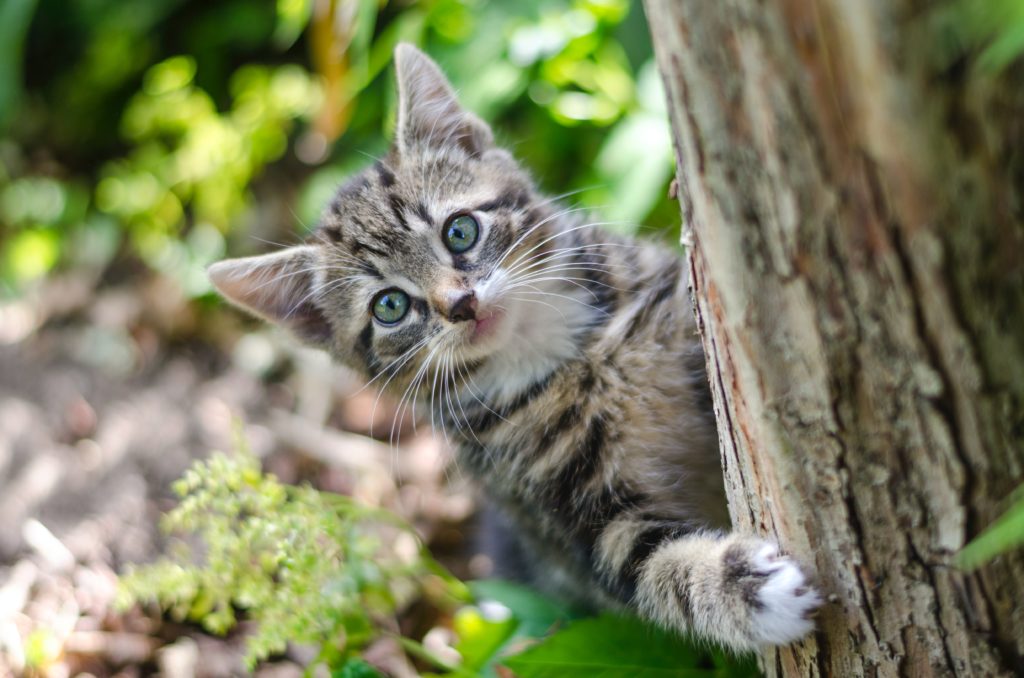Probiotics For Cats–A Closer Look

Probiotics have become a buzz word in the pet health space in recent years. Fortunately, due to so many studies both in the pet and human space, we are learning how beneficial and important probiotics are to the overall health of the microbiome.
What are probiotics?
Probiotics are living microorganisms that populate the gut, help balance the healthy gut flora, are responsible for making hormones, neurotransmitters, aid in digestion, and modulate the immune system. The microbiome is made up of billions of bacteria, viruses, fungi, and genes that live together and play vital roles in the overall function and health of the body.
Probiotics can be found in supplements, and they can also be consumed in foods. Foods with live cultures like organic, unsweetened grass fed yogurt, kefir or raw goat’s milk may be appealing to your cat. Or if your cat will eat them, fermented, unpasteurized vegetables can be offered as well.
Soil exposure is also beneficial. Therefore, if your cat has safe outdoor access it’s wonderful for them to roll around and play in the dirt!
What can probiotics help with?
Probiotics can be beneficial for many conditions, including:
- IBD
- Allergies
- Weakened or compromised immune systems
- Leaky gut
- Digestion
- Emotional health
- And much more!
What should you look for in a probiotic?
This is a great question! Dr. Katie Woodley, The Natural Pet Doctor, has several points to keep in mind when selecting a probiotic. Some of these details may require you to do a bit of research or contact the company if you don’t see this kind of information either on the product or the company’s website.
- Is the company doing third party testing?
- What research has the company done to back up their claims?
- Are the probiotics soil-based?
- How many different strains are present? (There should be multiple, not just one.)
- How many CFU’s (colony forming units) are in each strain? Is the number high enough to make a difference in the microbiome?
- Does the product list specific strains of bacteria? Ie: Bifidobacterium bifidum
- Are the probiotics alive? (They should be.)
- Is there an enteric coating of some kind to protect from stomach acid? (If not they won’t survive.)
- What is the manufacturing date? Expiration date? (This determines how effective they will be.)
- Does the company use good quality control and manufacturing practices? Ie: Look for labels like NASC, the National Animal Supplement Council.
- Does the product have things like fillers, sugar, food additives, coloring? If so, why?
- Are prebiotics included, which is a food source for the probiotics? (Look for things like inulin, chicory root, fructooligosaccharides, monooligosaccharides, or mushrooms.)
- How is the product stored? (If it’s sitting in a hot warehouse for extended periods of time the microbes will die.)
Read the label!
Just like in cat food, it’s important that we always read the label of the supplements we buy, including probiotics. Some brands will use beautiful marketing messages or imagery that can be deceptive.
Dr. Woodley also points out that some brands add coloring like titanium dioxide as a whitener to their probiotics. The European Union has banned the use of titanium dioxide as a food additive. Studies have shown it to cause cell damage and promotes inflammation, which is the opposite of what we want in the microbiome. So why is this not banned in pet food in the United States?
Another popular brand, Forti Flora, uses animal digest as a palatant. Animal digest is partially hydrolyzed animal tissue made from rendered, 4-D animals (dead, dying, diseased and disabled). These animal sources are condemned and not approved for human consumption. Does that sound like something you want your cat to eat?
Other considerations when using probiotics
Probiotics don’t always agree with every cat. Cats who are super sensitive may react with loose stools, and brewer’s yeast can make cats itchier. Furthermore, an overgrowth of healthy gut flora can actually cause problems, a condition called SIBO, Small Intestinal Bacteria Overgrowth. Therefore, it’s important to know WHY you’re using a probiotic to begin with. Dr. Woodley says that oftentimes probiotics are overused, so be sure to first check with your vet to be sure that using a probiotic would be necessary and beneficial to improve your cat’s health condition. Finally, it’s important to know why you are using a probiotic supplement and that it’s for a specific period of time, not forever. The goal should be to balance and harmonize the ecosystem in order to have a healthy, happy cat!
References:
Dr. Karen Becker, Probiotics: Beneficial Bacteria For Immune And Gut Health

